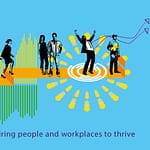Generation Y presents a unique challenge for HR departments looking to optimize both employee engagement and productivity. The term “millennials” is now the more common distinction for those who belong to this age group, and where exactly the demographic begins and ends remains somewhat nebulous – birth years are generally thought to range from the beginning of the 1980s to the early half of the 2000s. But one thing remains clear: It’s a generation that has been formed by a much more central role and widespread presence of technology than any preceding era witnessed. And as Gen Y’s members begin to enter the workforce, they’re often quite different as employees than even those just five to 10 years their senior.
Whether we have the Great Recession, the rise of smartphones and tablets or the ubiquitousness of social media to thank for that is up for debate, but it’s certain that a company committed to hiring millennials needs to consider how to create a work environment that’s designed to bring the most out of the demographic.Recognise talent
One particularly new characteristic of Gen Y is how prone its members are to question the concept of seniority, a recent report by office hardware and software firm Ricoh suggested. Having grown up in a culture that values speed, raw talent and innovation, millennials want their ideas and hard work to be recognized, not the length of their tenure with a given company.
“The traditional path is slow and steady, and the new one is possibly the fastest track in history.Millennial workers wielding exciting new skills are dropping into companies at mid-level and, in some cases, leapfrogging veteran colleagues to seniority,” noted Terrie Campbell, Ricoh’s vice president for strategic marketing.
Given the democratic, information-centric mindset of the demographic, Campbell went on to suggest that it may become necessary for companies that want to attract skilled millennials to allow them to begin employment at mid-level rather than entry-level.
Embrace decentralisation
Less hierarchical business models are also likely to appeal to Gen Y. In a column for CEO.com, serial entrepreneur Kevin Kruse discussed a new book by anthropologist Andrew Jones that asserts the influx of millennials into the corporate landscape has created a Fifth Age of Work, as Jones put it, beyond the information economy. Kruse suggested that companies stand to gain from capitalizing on the decentralized character of the new age’s work habits.
“While the industrial age required command and control structures, the Fifth Age requires leaders who know how to assemble and empower workgroups – flexible communities that can largely self-manage as they work towards their goals,” Kruse wrote.
Promote collaboration
With contemporary culture as social media-saturated as it is, it should come as no surprise that millennials thrive when allowed to collaborate in more active, meaningful ways than their generational predecessors might prefer. Fostering an interactive co-worker atmosphere is another way in which HR departments can take advantage of the decentralized, fluid way Gen Y likes to work.
In order to implement these changes, however, HR teams will need to have the insightful, actionable data required to build an effective strategy.
Download the eBook on the 3 next steps to take after your engagement survey
This article on millennials as employees was written by David Bator of TemboStatus.




